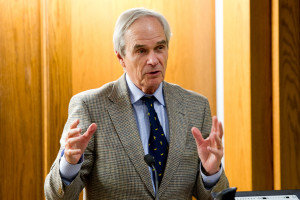
Trump Administration to end DACA, House passes bill to regulate self-driving cars, and more…
IN THE NEWS
- Attorney General Jeff Sessions announced that the U.S. Department of Justice would repeal the Deferred Action for Childhood Arrivals (DACA) program, an Obama-era policy that instructed the U.S. Department of Homeland Security (DHS) to use “prosecutorial discretion” when implementing immigration laws as applied to “certain young people who were brought to this country as children and know only this country as home.” Under DACA, the government would refrain from prosecuting these individuals in immigration enforcement actions if the individuals fulfilled criteria established by DHS. Sessions argued that DACA “denied jobs to hundreds of thousands of Americans.” President Barack Obama condemned the decision to repeal DACA, emphasizing that the repeal “isn’t required legally.”
- The U.S. House of Representatives passed a bill regulating self-driving cars. The bill seeks “to memorialize the Federal role in ensuring the safety of highly automated vehicles by encouraging the testing and deployment of such vehicles.” Specifically, the bill prevents states from creating or maintaining their own rules for self-driving cars, except when state rules are “identical to” the ones adopted by the federal government through the National Highway Traffic Safety Administration, and the bill sets out safety standards for “the development and deployment of” self-driving cars.
- In light of the extensive damage caused by Hurricane Harvey, a group of Democratic senators urged President Donald Trump to reinstate regulations intended to ensure federal infrastructure is built to withstand extreme flooding. President Trump repealed these regulations last month “to ensure the Federal permitting process for infrastructure is more coordinated and predictable,” in a decision the senators called “dangerous” and “misguided.”
- President Trump nominated Jonathan F. Mitchell, currently a Visiting Professor of Law at Stanford Law School, to a five year term as Chairman of the Administrative Conference of the United States (ACUS). ACUS is an independent federal agency dedicated to improving the administrative process via research and providing expert advice and recommendations.
- Kering and LVMH, two of the largest fashion conglomerates, issued a charter for the well-being of models. Some of the charter’s self-imposed limits include minimum size requirements for models, regular medical examinations, and specific curfew and guardian rules for models under 18.
- Computer manufacturer Lenovo reached a settlement agreement with the Federal Trade Commission (FTC) that its software violated user privacy in an attempt by the company to deliver better-tailored ads. Acting FTC Chairman Maureen K. Ohlhausen said of the settlement, “Lenovo compromised consumers’ privacy when it preloaded software that could access consumers’ sensitive information without adequate notice or consent to its use.”
- The American Gaming Association filed a brief with the U.S. Supreme Court supporting New Jersey’s attempt to overturn the Professional and Amateur Sports Protection Act (PASPA), which keeps states from authorizing sports betting. The Association argued that PASPA “undermines core federalism principles” by binding states to a “failed federal regime” and not allowing state-level experimentation.
- The U.S. Environmental Protection Agency (EPA) announced its publication of its responses to state designation recommendations for the 2010 sulfur dioxide primary national ambient air quality standards. EPA has invited public comment “to review and provide input” on their intended designations for the affected areas and will publish final designations no later than December 31, 2017.
- President Donald Trump nominated Emily W. Murphy, current Senior Advisor to the Administrator at the U.S. General Services Administration (GSA), to be Administrator of GSA. GSA is responsible for providing workplaces by “constructing, managing, and preserving government buildings and by leasing and managing commercial real estate.” Larry Allen, president of a major government contractor, reportedly said, “Emily is extremely well qualified for the job from her previous experience with the agency and on Capitol Hill.”
- U.S. Representative Greg Walden (R-Ore.), Chairman of the Committee on Energy and Commerce, and Representative Tim Murphy (R-Pa.) Chairman of the Subcommittee on Oversight and Investigations, sent U.S. Environmental Protection Agency (EPA) Administrator Scott Pruitt a letter asking EPA to inform the Committee on Energy and Commerce on EPA’s “workforce reduction initiatives.” In the light of “recent news reports” on EPA’s plan to use buyouts and encourage early retirement to cut its staff, the representatives wrote to Pruitt “to ensure that” the buyouts “are an efficient use of taxpayer money and are in compliance with” the applicable rules.
WHAT WE’RE READING THIS WEEK
- In a forthcoming paper for the George Washington Law Review, Kristin E. Hickman and Nicholas R. Bednar, both of the University of Minnesota Law School, called that claims that Chevron deference is in decline “overblown.” Hickman and Bednar also suggested that “those who actively seek to eliminate Chevron deference are aiming at the wrong target” because Chevron is a standard of judicial review and does not determine the outcome in most cases in which it is applied on its own.
- In a report for the Free State Foundation, James E. Prieger of the Pepperdine University School of Public Policy highlighted “the economic analysis of key net neutrality rules.” Prieger’s analysis comes in light of the millions of comments responding to a proposed rule by the Federal Communications Commission (FCC) to discontinue its 2015 rule banning actions that stifle consumers’ use of the Internet. Prieger and a group of other economists amassed studies showing “known results about net neutrality issues.” Ultimately, Prieger wrote that “the economic rationale against many net neutrality prohibitions is quite strong” and “economic analysis gives many reasons to be suspicious of the 2015 net neutrality regulations.” Priger urged the FCC to “make use of this knowledge” in deciding whether to halt net neutrality, which Prieger claimed the FCC did not do when it adopted its 2015 rule.
- In an article for the Federal Law Review, Paul Latimer, Adjunct Professor at Australia’s Swinburne University of Technology – Swinburne Law School, argued for moving from state and territorial regulation of retirement villages to federal regulation of retirement villages in Australia. Latimer contended that bringing retirement villages under the definition of a “financial product” within the Corporations Act 2001 (Cth) and the Australian Securities and Investments Commission Act 2001 (Cth) would result in a “return to Commonwealth leadership of the regulation of retirement villages to harmonise and to consolidate the current mix of State and Territory regulation with federal legislation including an enforceable Retirement Villages Code of Conduct.”



